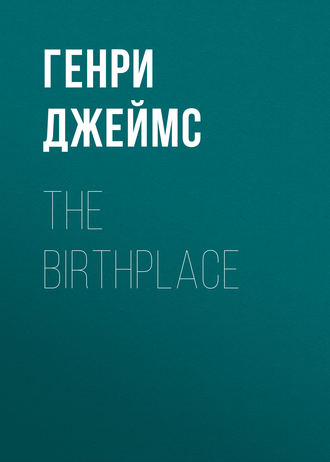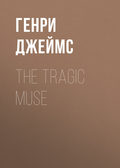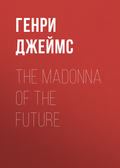
Генри Джеймс
The Birthplace
"Yes," Gedge mused again; "I wish awfully she hadn't!"
"You'd like the relics destroyed, removed? That's all that's wanted!"
"There are no relics."
"There won't be any soon—unless you take care." But he was already laughing, and the talk wasn't dropped without his having patted her once more. An impression or two nevertheless remained with her from it, as he saw from a question she asked him on the morrow. "What did you mean yesterday about Miss Putchin's simplicity—its keeping her 'straight'? Do you mean mentally?"
Her "mentally" was rather portentous, but he practically confessed. "Well, it kept her up. I mean," he amended, laughing, "it kept her down."
It was really as if she had been a little uneasy. "You consider there's a danger of your being affected? You know what I mean—of its going to your head. You do know," she insisted as he said nothing. "Through your caring for him so. You'd certainly be right in that case about its having been a mistake for you to plunge so deep." And then as his listening without reply, though with his look a little sad for her, might have denoted that, allowing for extravagance of statement, he saw there was something in it: "Give up your prowls. Keep it for daylight. Keep it for Them."
"Ah," he smiled, "if one could! My prowls," he added, "are what I most enjoy. They're the only time, as I've told you before, that I'm really with Him. Then I don't see the place. He isn't the place."
"I don't care for what you 'don't see,'" she returned with vivacity; "the question is of what you do see."
Well, if it was, he waited before meeting it. "Do you know what I sometimes do?" And then as she waited too: "In the Birthroom there, when I look in late, I often put out my light. That makes it better."
"Makes what–?"
"Everything."
"What is it then you see in the dark?"
"Nothing!" said Morris Gedge.
"And what's the pleasure of that?"
"Well, what the American ladies say. It's so fascinating!"
IV
The autumn was brisk, as Miss Putchin had told them it would be, but business naturally fell off with the winter months and the short days. There was rarely an hour indeed without a call of some sort, and they were never allowed to forget that they kept the shop in all the world, as they might say, where custom was least fluctuating. The seasons told on it, as they tell on travel, but no other influence, consideration or convulsion to which the population of the globe is exposed. This population, never exactly in simultaneous hordes, but in a full swift and steady stream, passed through the smoothly-working mill and went, in its variety of degrees duly impressed and edified, on its artless way. Gedge gave himself up, with much ingenuity of spirit, to trying to keep in relation with it; having even at moments, in the early time, glimpses of the chance that the impressions gathered from so rare an opportunity for contact with the general mind might prove as interesting as anything else in the connexion. Types, classes, nationalities, manners, diversities of behaviour, modes of seeing, feeling, of expression, would pass before him and become for him, after a fashion, the experience of an untravelled man. His journeys had been short and saving, but poetic justice again seemed inclined to work for him in placing him just at the point in all Europe perhaps where the confluence of races was thickest. The theory at any rate carried him on, operating helpfully for the term of his anxious beginnings and gilding in a manner—it was the way he characterised the case to his wife—the somewhat stodgy gingerbread of their daily routine. They hadn't known many people and their visiting-list was small—which made it again poetic justice that they should be visited on such a scale. They dressed and were at home, they were under arms and received, and except for the offer of refreshment—and Gedge had his view that there would eventually be a buffet farmed out to a great firm—their hospitality would have made them princely if mere hospitality ever did. Thus they were launched, and it was interesting; so that from having been ready to drop, originally, with fatigue they emerged as even-winded and strong in the legs as if they had had an Alpine holiday. This experience, Gedge opined, also represented, as a gain, a like seasoning of the spirit—by which he meant a certain command of impenetrable patience.
The patience was needed for the particular feature of the ordeal that, by the time the lively season was with them again, had disengaged itself as the sharpest—the immense assumption of veracities and sanctities, of the general soundness of the legend, with which every one arrived. He was well provided certainly for meeting it, and he gave all he had, yet he had sometimes the sense of a vague resentment on the part of his pilgrims at his not ladling out their fare with a bigger spoon. An irritation had begun to grumble in him during the comparatively idle months of winter when a pilgrim would turn up singly. The pious individual, entertained for the half-hour, had occasionally seemed to offer him the promise of beguilement or the semblance of a personal relation; it came back again to the few pleasant calls he had received in the course of a life almost void of social amenity. Sometimes he liked the person, the face, the speech: an educated man, a gentleman, not one of the herd; a graceful woman, vague, accidental, unconscious of him, but making him wonder, while he hovered, who she was. These chances represented for him light yearnings and faint flutters; they acted indeed within him to a special, an extraordinary tune. He would have liked to talk with such stray companions, to talk with them really, to talk with them as he might have talked had he met them where he couldn't meet them—at dinner, in the "world," on a visit at a country-house. Then he could have said—and about the shrine and the idol always—things he couldn't say now. The form in which his irritation first came to him was that of his feeling obliged to say to them—to the single visitor, even when sympathetic, quite as to the gaping group—the particular things, a dreadful dozen or so, that they expected. If he had thus arrived at characterising these things as dreadful the reason touched the very point that, for a while turning everything over, he kept dodging, not facing, trying to ignore. The point was that he was on his way to become two quite different persons, the public and the private—as to which it would somehow have to be managed that these persons should live together. He was splitting into halves, unmistakably—he who, whatever else he had been, had at least always been so entire and in his way so solid. One of the halves, or perhaps even, since the split promised to be rather unequal, one of the quarters, was the keeper, the showman, the priest of the idol; the other piece was the poor unsuccessful honest man he had always been.
There were moments when he recognised this primary character as he had never done before; when he in fact quite shook in his shoes at the idea that it perhaps had in reserve some supreme assertion of its identity. It was honest, verily, just by reason of the possibility. It was poor and unsuccessful because here it was just on the verge of quarrelling with its bread and butter. Salvation would be of course—the salvation of the showman—rigidly to keep it on the verge; not to let it, in other words, overpass by an inch. He might count on this, he said to himself, if there weren't any public—if there weren't thousands of people demanding of him what he was paid for. He saw the approach of the stage at which they would affect him, the thousands of people—and perhaps even more the earnest individual—as coming really to see if he were earning his wage. Wouldn't he soon begin to fancy them in league with the Body, practically deputed by it—given, no doubt, a kindled suspicion—to look in and report observations? It was the way he broke down with the lonely pilgrim that led to his first heart-searchings—broke down as to the courage required for damping an uncritical faith. What they all most wanted was to feel that everything was "just as it was"; only the shock of having to part with that vision was greater than any individual could bear unsupported. The bad moments were upstairs in the Birthroom, for here the forces pressing on the very edge assumed a dire intensity. The mere expression of eye, all-credulous, omnivorous and fairly moistening in the act, with which many persons gazed about, might eventually make it difficult for him to remain fairly civil. Often they came in pairs—sometimes one had come before–and then they explained to each other. He in that case never corrected; he listened, for the lesson of listening: after which he would remark to his wife that there was no end to what he was learning. He saw that if he should really ever break down it would be with her he would begin. He had given her hints and digs enough, but she was so inflamed with appreciation that she either didn't feel them or pretended not to understand.
This was the greater complication that, with the return of the spring and the increase of the public, her services were more required. She took the field with him from an early hour; she was present with the party above while he kept an eye, and still more an ear, on the party below; and how could he know, he asked himself, what she might say to them and what she might suffer Them to say—or in other words, poor wretches, to believe—while removed from his control? Some day or other, and before too long, he couldn't but think, he must have the matter out with her—the matter, namely, of the morality of their position. The morality of women was special—he was getting lights on that. Isabel's conception of her office was to cherish and enrich the legend. It was already, the legend, very taking, but what was she there for but to make it more so? She certainly wasn't there to chill any natural piety. If it was all in the air—all in their "eye," as the vulgar might say—that He had been born in the Birthroom, where was the value of the sixpences they took? where the equivalent they had engaged to supply? "Oh dear, yes—just about here"; and she must tap the place with her foot. "Altered? Oh dear, no—save in a few trifling particulars; you see the place—and isn't that just the charm of it?—quite as He saw it. Very poor and homely, no doubt; but that's just what's so wonderful." He didn't want to hear her, and yet he didn't want to give her her head; he didn't want to make difficulties or to snatch the bread from her mouth. But he must none the less give her a warning before they had gone too far. That was the way, one evening in June, he put it to her; the affluence, with the finest weather, having lately been of the largest and the crowd all day fairly gorged with the story. "We mustn't, you know, go too far."
The odd thing was that she had now ceased even to be conscious of what troubled him—she was so launched in her own career. "Too far for what?"
"To save our immortal souls. We mustn't, love, tell too many lies."
She looked at him with dire reproach. "Ah now are you going to begin again?"
"I never have begun; I haven't wanted to worry you. But, you know, we don't know anything about it." And then as she stared, flushing: "About His having been born up there. About anything really. Not the least little scrap that would weigh in any other connexion as evidence. So don't rub it in so."
"Rub it in how?"
"That He was born–" But at sight of her face he only sighed. "Oh dear, oh dear!"
"Don't you think," she replied cuttingly, "that He was born anywhere?"
He hesitated—it was such an edifice to shake. "Well, we don't know. There's very little to know. He covered His tracks as no other human being has ever done."
She was still in her public costume and hadn't taken off the gloves she made a point of wearing as a part of that uniform; she remembered how the rustling housekeeper in the Border castle, on whom she had begun by modelling herself, had worn them. She seemed official and slightly distant. "To cover His tracks He must have had to exist. Have we got to give that up?"
"No, I don't ask you to give it up yet. But there's very little to go upon."
"And is that what I'm to tell Them in return for everything?"
Gedge waited—he walked about. The place was doubly still after the bustle of the day, and the summer evening rested on it as a blessing, making it, in its small state and ancientry, mellow and sweet. It was good to be there and it would be good to stay. At the same time there was something incalculable in the effect on one's nerves of the great gregarious density. This was an attitude that had nothing to do with degrees and shades, the attitude of wanting all or nothing. And you couldn't talk things over with it. You could only do that with friends, and then but in cases where you were sure the friends wouldn't betray you. "Couldn't you adopt," he replied at last, "a slightly more discreet method? What we can say is that things have been said; that's all we have to do with. 'And is this really'—when they jam their umbrellas into the floor—'the very spot where He was born?' 'So it has, from a long time back, been described as being.' Couldn't one meet Them, to be decent a little, in some such way as that?"
She looked at him very hard. "Is that the way you meet them?"
"No; I've kept on lying—without scruple, without shame."
"Then why do you haul me up?"
"Because it has seemed to me we might, like true companions, work it out a little together."
This was not strong, he felt, as, pausing with his hands in his pockets, he stood before her; and he knew it as weaker still after she had looked at him a minute. "Morris Gedge, I propose to be your true companion, and I've come here to stay. That's all I've got to say." It was not, however, for "You had better try yourself and see," she presently added. "Give the place, give the story away, by so much as a look, and—well, I'd allow you about nine days. Then you'd see."
He feigned, to gain time, an innocence. "They'd take it so ill?" And then as she said nothing: "They'd turn and rend me? They'd tear me to pieces?"
But she wouldn't make a joke of it. "They wouldn't have it, simply."
"No—They wouldn't. That's what I say. They won't."
"You had better," she went on, "begin with Grant-Jackson. But even that isn't necessary. It would get to him, it would get to the Body, like wildfire."
"I see," said poor Gedge. And indeed for the moment he did see, while his companion followed up what she believed her advantage.
"Do you consider it's all a fraud?"
"Well, I grant you there was somebody. But the details are naught. The links are missing. The evidence—in particular about that room upstairs, in itself our Casa Santa—is nil. It was so awfully long ago." Which he knew again sounded weak.
"Of course it was awfully long ago—that's just the beauty and the interest. Tell Them, tell Them," she continued, "that the evidence is nil, and I'll tell Them something else." She spoke it with such meaning that his face seemed to show a question, to which she was on the spot of replying, "I'll tell Them you're a–" She stopped, however, changing it. "I'll tell Them exactly the opposite. And I'll find out what you say—it won't take long—to do it. If we tell different stories that possibly may save us."
"I see what you mean. It would perhaps, as an oddity, have a success of curiosity. It might become a draw. Still, They but want broad masses." And he looked at her sadly. "You're no more than one of Them."
"If it's being no more than one of Them to love it," she answered, "then I certainly am. And I'm not ashamed of my company."
"To love what?" said Morris Gedge.
"To love to think He was born there."
"You think too much. It's bad for you." He turned away with his chronic moan. But it was without losing what she called after him.
"I decline to let the place down." And what was there indeed to say? They were there to keep it up.







